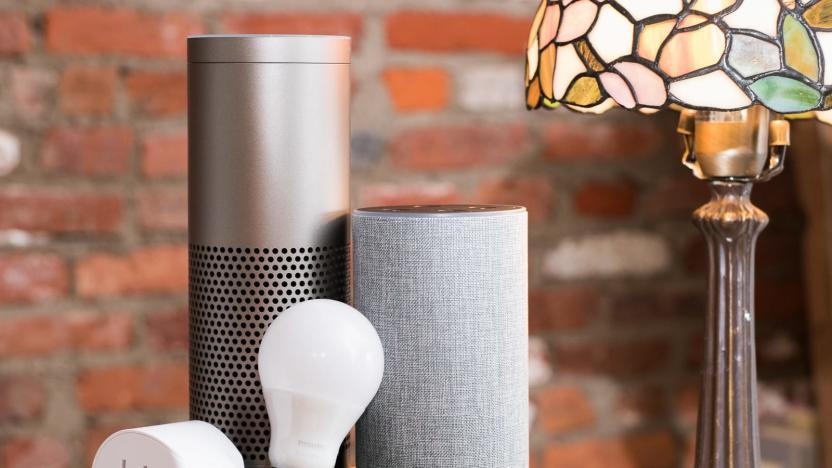Roomba960
Latest

The best Alexa-compatible smart-home devices for Amazon Echo
By Rachel Cericola This post was done in partnership with Wirecutter. When readers choose to buy Wirecutter's independently chosen editorial picks, Wirecutter and Engadget may earn affiliate commission. Read the full guide to Alexa-compatible smart-home devices for Amazon Echo. Imagine walking into your home at night, arms overflowing with groceries. Even if you've installed smart lights, you'd need to put the bags down, pull out your phone, unlock it, open the app, find the control for the lights you want, and then tap the icon—might as well just stick with a plain old wired switch. But with an Alexa, you simply say, "Alexa, turn on the kitchen lights." And it's not just lights; Alexa is capable of controlling everything from basic smart plugs to garage doors. All three smart-speaker platforms (Alexa, Google Assistant, and to a lesser degree, Siri) can control a variety of smart-home devices and add an extra level of convenience to your smart-home system. We think Amazon's Alexa has a slight edge over the others because it works with more devices, and the wider family of Amazon Echo products makes it easier to fit them everyplace in your home. However, if you already have a Google Home speaker, the differences aren't large enough for you to need to switch platforms. We have guides for the best devices to use with Google Assistant and Siri/HomeKit. The Amazon Echo (or Echo Dot) offers a convenient interface for your smart home and provides functionality that an app on your phone can't. If you already have some Alexa-compatible devices or one of the three major smart-home hubs (SmartThings, Wink, or Insteon), adding an Echo can make accessing those devices more interesting and convenient. Taking advantage of its near-instantaneous response time and reliable voice-recognition processing is significantly faster than pulling out your phone and opening an app just to turn the lights on or off. Some products, such as Philips Hue lights and Nest thermostats, have native Alexa support, while others require you to enable a third-party skill. We tested plenty of both varieties to come up with the best-performing and most reliable recommendations, which we're continually testing to ensure that each new firmware and app update meets our high standards. Over the past several years, Wirecutter's editors and writers have tested just about every smart-home device of consequence. As more people end up buying smart speakers and platform support gets more and more important, we wanted to provide one place where you could access all of our picks that are compatible with the devices you already own, across all of our smart-home recommendations. Because these devices receive regular updates with additional compatibility and new features, we are continually testing and reevaluating our picks in our own homes to confirm that they still meet our recommendation standards. We'll update this guide as we learn new information, but be sure to read the full reviews if you'd like more details and test notes. If you don't yet have an Alexa-enabled device, or you want to learn more about what Alexa is and what you can do with these things, check out our full guide to Alexa and Amazon's Echo line of smart speakers.

The best robot vacuums
By Liam McCabe This post was done in partnership with Wirecutter. When readers choose to buy Wirecutter's independently chosen editorial picks, it may earn affiliate commissions that support its work. Read the original article here. After running more than 90 cleaning cycles with 14 of the most promising robot vacuums in 2017, we think the EcoVacs Deebot N79 is the best choice for most people who want a basic, affordable bot that can actually keep their floors tidy. The Deebot N79 is nimble enough to navigate most homes without getting stuck often—and that's what really makes most bot owners happy. Its battery life is the longest we've seen, it runs the quietest, and it has one of the better control schemes we've seen for the price—including Wi-Fi and a smartphone app. It works best on short carpet and bare floors, in areas smaller than 1,200 square feet, with only modest amounts of pet hair—limitations that stronger, smarter, pricier bots don't have. But the Deebot N79 is the best of the affordable robot vacuums, and if you run it at least a few times per week, it can keep your floors free of obvious debris with very little effort on your part. EcoVacs also makes a newer, more-expensive version of this robot called the Deebot N79S. It's basically the same as the old one, but it works with Alexa voice commands and has an option where you can boost the suction. That feature reduces the battery run time, though, and we found that as a result of that trade-off, it picks up a similar amount of debris per session. We'd spend our own money on the older Deebot N79, in the interest of saving a few dollars. But the newer Deebot N79S does work well, if you think the voice-command functionality is worth paying extra.

The Roomba 960 is iRobot's cheaper app-driven robot vacuum
The $900 WiFi-connected Roomba 980 is pretty exorbitant for many folks, nice as it is, so Robot has launched the $700 Roomba 960. The new model has a less powerful motor and battery, but retains the WiFi connectivity, floor mapping and app control of the high-end model. The price is the same as Neato's BotVac Connected, so it could sway techy users who really want the extra control a smartphone brings. By contrast, the cheapest, non-connected Roomba 650 is $375.
